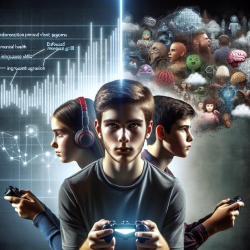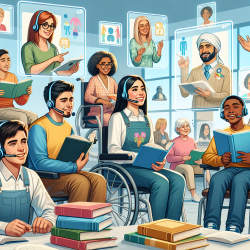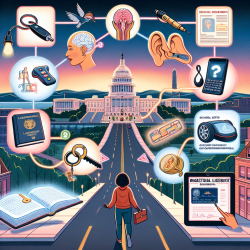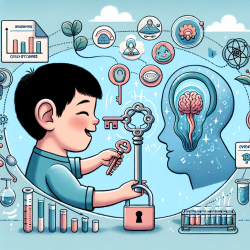Introduction
In the realm of speech-language pathology and child development, understanding the influences on adolescent behavior is crucial. A recent study titled "Correlates of video games playing among adolescents in an Islamic country" provides valuable insights into how video gaming affects adolescents' mental health and behavior. This blog aims to distill the findings of this study and explore how practitioners can leverage this data to improve outcomes for children.
Key Findings
The study, conducted in Iran, involved a cross-sectional analysis of 444 middle-school students. It examined the relationship between video game playing and various psychological and behavioral outcomes. Here are some of the critical findings:
- Participants spent an average of 6.3 hours per week playing video games, with 47% engaging in violent games.
- Non-gamers and excessive gamers reported poorer mental health compared to moderate gamers.
- Excessive gaming was linked to increased aggressive behaviors, particularly among boys.
- Those who perceived fewer negative side effects of gaming were more likely to engage in excessive gaming.
Implications for Practitioners
Understanding these findings can help practitioners in several ways:
- Moderation is Key: Encourage moderate gaming as it is associated with better mental health outcomes compared to non-gaming or excessive gaming.
- Gender-Specific Interventions: Tailor interventions to address the specific needs of boys, who are more prone to aggressive behaviors associated with excessive gaming.
- Educational Interventions: Develop programs to educate adolescents and parents about the potential negative impacts of excessive gaming, emphasizing the importance of balance.
- Promote Pro-Social Games: Encourage the use of pro-social video games, which can foster positive social behaviors and interactions.
Encouraging Further Research
While this study provides valuable insights, it also highlights the need for further research, particularly in diverse cultural contexts. Practitioners are encouraged to explore the following areas:
- Longitudinal studies to assess the long-term impacts of gaming on adolescent development.
- Cross-cultural studies to understand how cultural factors influence gaming behaviors and outcomes.
- Investigations into the impact of specific game genres on different aspects of adolescent development.
Conclusion
By integrating the findings of this study into practice, speech-language pathologists and other child development professionals can better support adolescents in navigating the complex world of video gaming. For those interested in delving deeper into the research, the original study provides a comprehensive analysis of these issues.
To read the original research paper, please follow this link: Correlates of video games playing among adolescents in an Islamic country.










